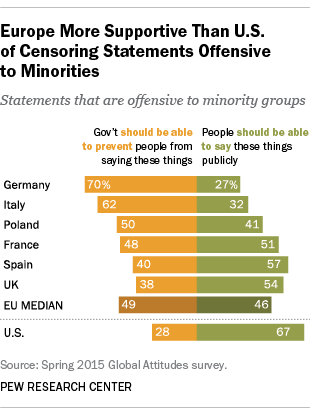A number of federal states in Germany have said that the symbolic use of the letter ‘Z’ can now be considered a criminal offence.
Officials in at least two German states have threatened residents with criminal prosecution should they decide to use the letter ‘Z’ as a symbol.
While innocuous as of a number of months ago, the letter has since gained infamy as a result of Russian forces using a Z-like mark on their vehicles, likely as a way of avoiding issues with friendly fire.
The letter has evolved to become a rallying symbol for supporters of Russian servicemen, as well as Russia’s President Vladimir Putin.
Consequently, authorities in anti-free speech Germany have decided to clamp down on the letter’s usage, according to a report by broadcaster Deutschlandfunk.

Source: Pew Research Centre
According to officials in the federal states of Bavaria and Lower Saxony, those who publicly express their “approval” of Russia’s war efforts should expect to be put under criminal investigation, while the public display of the ‘Z’ symbol could be considered a “disturbance of the peace” and a criminal offence.
Germany is not the only location where the symbol is under fire, with a number of Lithuanian MPs calling for those who use the symbol to face fines of up to €500.
However, for German authorities, such a punishment seemingly does not go far enough, with Die Welt reporting that showing the symbol during a demonstration could land a protester with a potential three-year jail term on top or instead of a possible fine.
“We do not accept international crimes being condoned,” the publication reports Bavaria’s Justice Minister, Georg Eisenreich, as saying, while also threatening Russian “sympathisers” with criminal proceedings should they dare express their beliefs.
While three years behind bars may appear to be an extreme response to someone displaying the letter ‘Z’ during a protest, the threat is very much in keeping with German attitudes towards freedom of expression.
For example, German police conducted mass raids on the homes of those suspected of posting insults online during last year’s general election on Tuesday, because, as the Federal Criminal Police Office put it, “insults, slander and defamation of people in political life [are] particularly punishable” under the criminal code.
Over 100 people across 13 different states were “searched and questioned” during the police operation, with the “joint day of action” being used by German authorities to threaten netizens who would post similar insults, slander, or defamation against elected officials online in the future.
“With the day of action, we are making it clear: Anyone who posts hate messages must expect the police to be at the door afterwards,” said President of the Federal Criminal Police Office, Holger Münch.
“This day of action illustrates the extent to which public officials and elected representatives are insulted, slandered and threatened on the Internet,” said another official, Torsten Kunze.
“In order to prevent the withdrawal of those affected from reaching a level that endangers democracy, we are prosecuting these crimes consistently and in close cooperation with the public prosecutors of the other federal states.”
